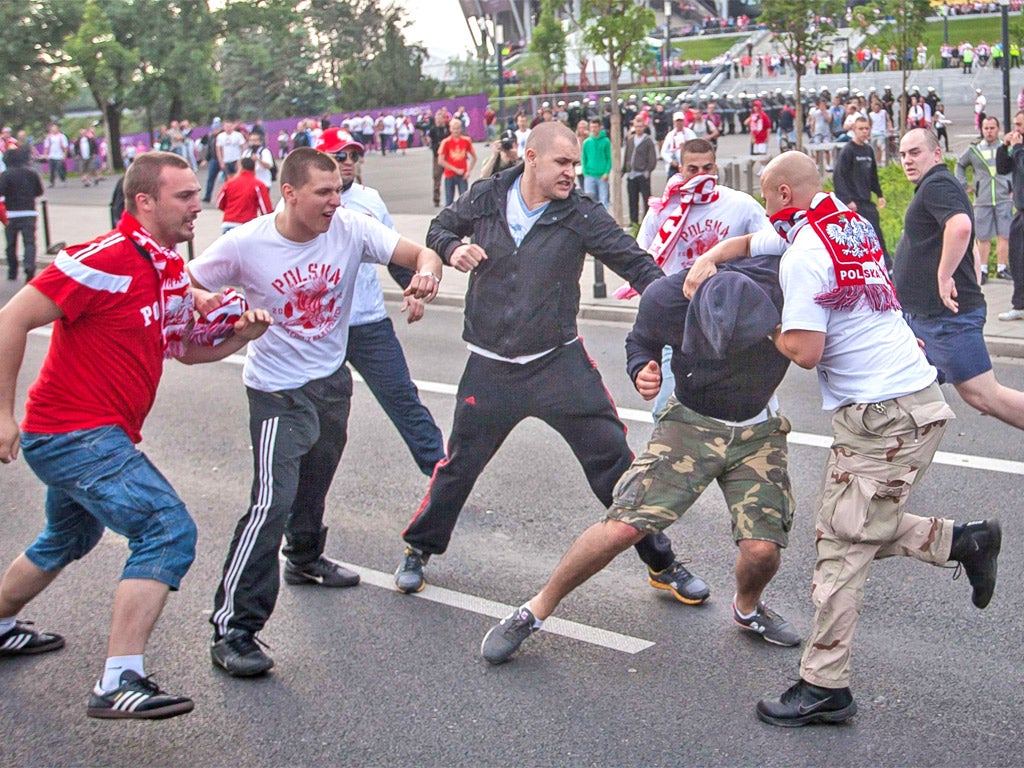Warsaw mayor issues apology for 'scandalous' hooliganism surrounding Poland match with Russia
Official says sorry to her country's guests after violent clashes between Polish and Russian fans

Your support helps us to tell the story
From reproductive rights to climate change to Big Tech, The Independent is on the ground when the story is developing. Whether it's investigating the financials of Elon Musk's pro-Trump PAC or producing our latest documentary, 'The A Word', which shines a light on the American women fighting for reproductive rights, we know how important it is to parse out the facts from the messaging.
At such a critical moment in US history, we need reporters on the ground. Your donation allows us to keep sending journalists to speak to both sides of the story.
The Independent is trusted by Americans across the entire political spectrum. And unlike many other quality news outlets, we choose not to lock Americans out of our reporting and analysis with paywalls. We believe quality journalism should be available to everyone, paid for by those who can afford it.
Your support makes all the difference.Warsaw's mayor apologised yesterday to visitors for the football hooligan violence that left dozens injured and caused others to feel unsafe, a day after Poland and Russia fans clashed with each other and police when their teams met in a tense European Championship game.
For the most part, however, Polish officials tried to put a positive spin on Tuesday's disturbances, saying a strong and effective police response prevented worse bloodshed. One official called it the biggest police security operation in Warsaw. Riot police fired rubber bullets and used water cannon and tear gas, while officers detained 184 people – most of them Poles.
The Interior Ministry issued a statement saying police "did not allow aggression to escalate on the part of the hooligans" and caught "the most aggressive fans". It also stressed that most Polish and Russian fans enjoyed themselves in a spirit of "festivity."
Mayor Hanna Gronkiewicz-Waltz apologised to "our guests", calling the violence a "scandalous" disturbance of public order: "I apologise and I deplore the fact that hooligans have exposed our guests to a loss of a sense of security."
Authorities gave varying figures on the number of injured. Police said 19 civilians and 17 officers were injured; ambulance officials gave an overall figure of 24 earlier in the day; and Warsaw province governor, Jacek Kozlowski, said up to 140 people required some type of medical treatment.
The trouble started when about 5,000 Russians marched through central Warsaw waving national flags and chanting "Russia, Russia" while making their way to the National Stadium for Tuesday's game. It was seen as provocative to many Poles. The two countries share a difficult history, including decades of control by Moscow over Poland during the Cold War. Many Poles felt the authorities should not have allowed the Russians to march in Warsaw given the historical wounds.
The Prime Minister, Donald Tusk, said that, all in all, the trouble was "limited in scale" compared to what it might have been given the heated national emotions and the numbers of fans. About 45,000 people watched the game at the stadium and around 75,000 others on huge TV screens in a downtown fan zone. The fights were scattered across downtown Warsaw. None were at the National Stadium or in the downtown fan zone.
The game ended in a 1-1 draw and that may have helped defuse tensions from escalating into further violence since neither side could claim victory over the other. The final score also prompted comments of relief from Poland supporters and newspaper headlines yesterday that stressed Poland still has a chance to advance to the quarter-finals if they defeat the Czech Republic on Saturday.
Police said they would review their security procedures. The clashes were embarrassing and painful to many Poles, who resent that a small number of thugs cast a bad light on the country. Poland has been looking to Euro 2012 to highlight how much it has modernised and developed since throwing off communism in 1989.
"I would say that it shouldn't have happened, it should have been prevented and I would say that it shouldn't happen in the future because it is very bad for the image of Poland," Kamila Szczepanska, a 31-year-old Warsaw resident said.
"People hear that and they think 'OK, this is what is happening here normally and this is our attitude towards Russians' – it is not. It is not representative at all."
The injured included Russians, a German, an American and a Pakistani, Kozlowski told a news conference. One Russian and seven Poles were still in hospital yesterday , though none in a life-threatening condition, he said.
Police detained 156 Poles, more than 20 Russians, a Hungarian, a Spaniard and an Algerian, the Interior Ministry said. One Russian was detained after he threw a firecracker on to the field during the game.
The Russians will go through summary court trials aimed at expelling them from Poland and lifting their European Union visas for five years. Jacek Cichocki, the Interior Minister, said more than 6,000 police were deployed in Warsaw on Tuesday and another 770 were brought in at night. He said they were successful in assuring the security of regular fans.
Join our commenting forum
Join thought-provoking conversations, follow other Independent readers and see their replies
Comments